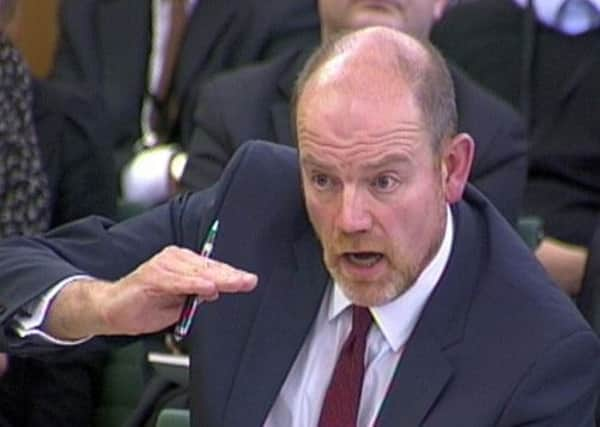Ex-boss denies BBC lost plot over pay-offs


Mr Thompson is one of seven senior BBC staff - past and present - appearing before the Commons Public Accounts Committee to answer MPs’ questions about who knew what about the excessive golden goodbyes which saw senior executives walk off with thousands of pounds more than their contracts demanded.
He said the move, which saw Mark Byford leave the BBC with a total payout of £949,000, was part of a move to axe senior executives which would give the BBC “£19 million of savings for every year into the future” and he believed he “had the full support of the BBC Trust” to order it.
Advertisement
Hide AdAdvertisement
Hide AdThe committee’s chair, Margaret Hodge, said people were looking at BBC management in “dismay” and asked Mr Thompson if the BBC had, under his management, lost the plot.
He said: “I do not think we lost the plot.”
Ms Hodge asked Mr Thompson why Mr Byford needed an extra payment when he was contractually due around half-a-million pounds, saying: “Why was £500,000, which is for most people mega bucks, not enough?”
Mr Thompson, who said he did not believe there was any “favouritism” in deciding pay-offs, said the pay-off to Mr Byford was needed so he would remain “focused” on his job and not be distracted.
He said he had inherited a way of doing things at the broadcaster, telling MPs: “I did not loosen the financial controls in this area.”
Advertisement
Hide AdAdvertisement
Hide AdStephen Barclay MP told Mr Thompson he had been “lax” in delegating authority and asked why more pay-offs had not been recommended to the Executive Board Remuneration Committee.
The former director-general said the term “lax” was “too strong” and added a “rapid aggressive change” which saw large numbers of senior managers leave presented the BBC with the “prize” of extra funding for programming.
He said: “The price you would have in 2009-10 for trying to do it was a delay which would have ended up costing more.”
He added: “The savings were so large a single month’s delay cost over £1 million.”
Advertisement
Hide AdAdvertisement
Hide AdIn written evidence published ahead of today’s meeting, Mr Thompson accused BBC Trust boss Lord Patten and trustee Anthony Fry of ‘’fundamentally misleading’’ committee members at a previous hearing.
At their last appearance before the committee, Lord Patten and Mr Fry told MPs members of the Trust were not always included in decision-making.
Mr Fry said there was ‘’some disconnect’’ between what Mr Thompson had written in a letter to the Trust about Mr Byford’s pay-off, in which he apparently declared it was within contractual arrangements, when the National Audit Office (NAO) found it was not.
Asked if he stood by his written evidence, Mr Thompson said “I do” and said the trust were “fully informed” of what was going on.
Advertisement
Hide AdAdvertisement
Hide AdLord Patten said he took the charge of misleading the committee “very strongly” and said his induction to the job included no references to severance pay and a media briefing he was given before the publication of the annual report said pay-offs to Mr Byford and former marketing boss Sharon Baylay were “contractual payments”.
He said: “I’m in the position in which I’m accused of having misled the committee on something I didn’t know and couldn’t have been expected to know.”
Nicholas Kroll, the director of the BBC Trust, said he was not “closely involved” in the preparation of a note on October 7 2010 about the Byford payment.
He conceded the pay-off was “unquestionably a large figure” but a matter for the remuneration committee and not the trust.
Advertisement
Hide AdAdvertisement
Hide AdIn response, Jackie Doyle-Price MP told him the protection of licence-fee payer’s money was “a matter for the trust”.
Ms Hodge asked Mr Kroll, who is paid £238,000, how much he earns and told him “the job of the trust is to protect the licence fee payers’ interests”.
She said: “There is not one person around the table who can understand why there was no challenge from you”.